May 30, 2023
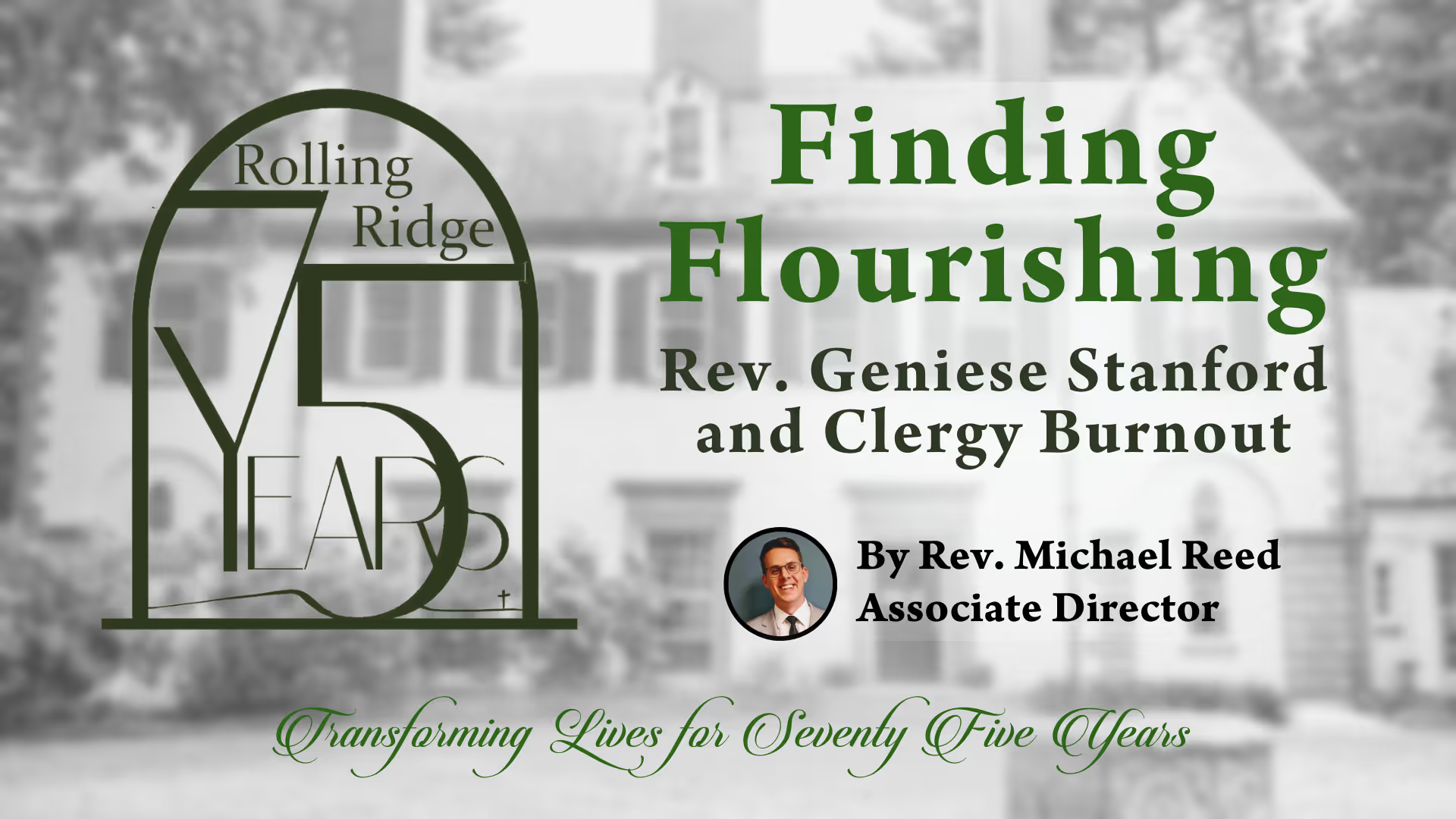
Geniese Stanford grew up on a cotton farm near a place called Notrees, Texas. “It’s called No-Trees,” she tells me. “Because there aren’t any trees!” In West Texas, she says, the few trees that do survive are forced to eke out a meager existence along the banks of creeks and riverbeds. “I was fascinated, moving to Massachusetts, by all the trees! And in particular, with a place like this. I just find this setting to be so inspiring.”
The setting, of course, is Rolling Ridge Retreat and Conference Center. Geniese and I are seated across from one another in the parlor of the historic main house. As she talks, she gestures towards the window, and my mind fills in the rest: the sky-scraping white pines, thickly settled American elms, and all manner of green and growing things that populate our grounds. I nod in agreement. Rolling Ridge is the perfect place to be at home among the trees.
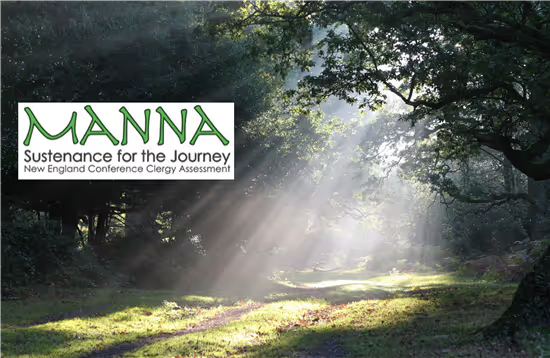
The Manna Program is a ministry
of the New England United Methodist Church
For Geniese, a tree is more than an object of fascination. It’s the living emblem of the central purpose in her life: flourishing. A retired United Methodist pastor, she is especially passionate about clergy flourishing. She believes that ‘as go the clergy, so go the churches.’ And she knows, from first-hand experience and from scores of academic research, that clergy, by and large, are not flourishing.
Clergy are under tremendous strain, and especially so in a post-COVID New England landscape. Sunday morning church attendance was already a struggle in a quickly-secularizing culture, and many pastors have noticed that things have not returned even to pre-pandemic levels. Congregations struggle to maintain their programs and buildings with fewer volunteers and thinner budgets. Their pastors—who often enter ministry with the best intentions of being “all things to all people”—often find themselves careening towards vocational burnout, as they try to do more with less, and care for others at their own spiritual expense.
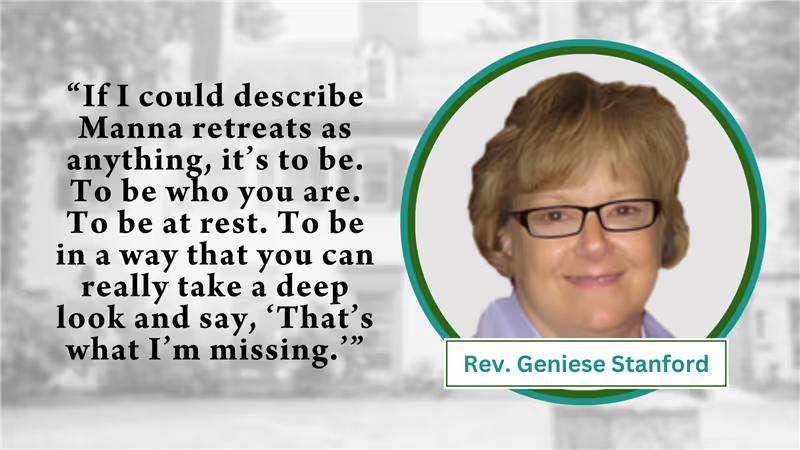
That’s why Geniese helped create “Manna” for the Board of Ordained Ministry to focus on clergy renewal for United Methodist clergy in New England. Her first task, however, is to convince clergy that it’s not a trap.
“In 2016, the [United Methodist] General Conference mandated a clergy assessment every eight years,” Geniese says. She tells me that most United Methodist pastors and Deacons assume—and Geniese herself agrees—that the intent of the assessment was to get rid of ineffective clergy. “We decided to do things differently here in New England. Because of [clergy] burnout, we decided to focus on flourishing and well-being.” Manna still meets the eight-year mandated requirements but takes a completely different tone and approach. “When people arrive, they’re usually highly anxious. They’re usually afraid they’ll be judged. Within the first couple hours here at the Ridge, they’ll settle in and start to relax.”
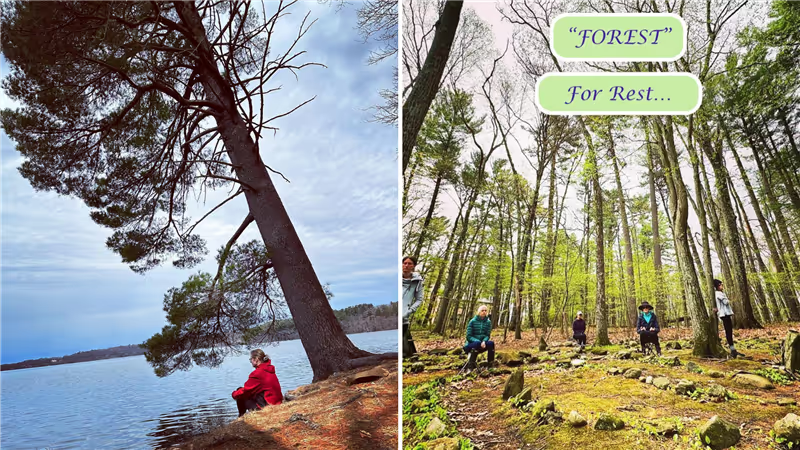
Participants at Rolling Ridge among the labyrinth and trees.
Photo credit: Christine Cohne/Nature’s Pace, LLC
One of those people is Rev. Rachel Fisher, pastor of Aldersgate United Methodist Church in North Reading, MA and a member of our Rolling Ridge board. She was part of one of the first Manna cohorts in 2021. “I went begrudgingly,” Rachel tells me with a laugh. “I didn’t want to go! I didn’t want to take the time.” What changed her mind, however, was discovering that she wasn’t there to be evaluated and found wanting, or have her precious time squandered with bureaucratic hoop-jumping. She was there to be blessed.
“They gave us resources,” Rachel told me, “A list of tools and insights for overall flourishing. I got to choose what to focus on based on what I needed.” Over the next six months, Rachel and a small group of other United Methodist clergy met with a spiritual director over ZOOM. “The spiritual director was absolutely top-notch,” she says. But what stands out more than anything, perhaps, is her retreat experience at the Ridge. She tells me of a particular moment that stands out—one that Geniese, or any lover of trees, could affirm with a smile. Rachel remembers sitting on her yoga mat, hidden away in Room 5 of the Ridge’s Main House, painting a picture of a tree. As she painted, she reflected on her own calling—from the acorn of her initial call to the five great ‘branches’ of her life and ministry, 25 years later. The painting hangs in her office to this day, reminding her of what it means for her to truly flourish.
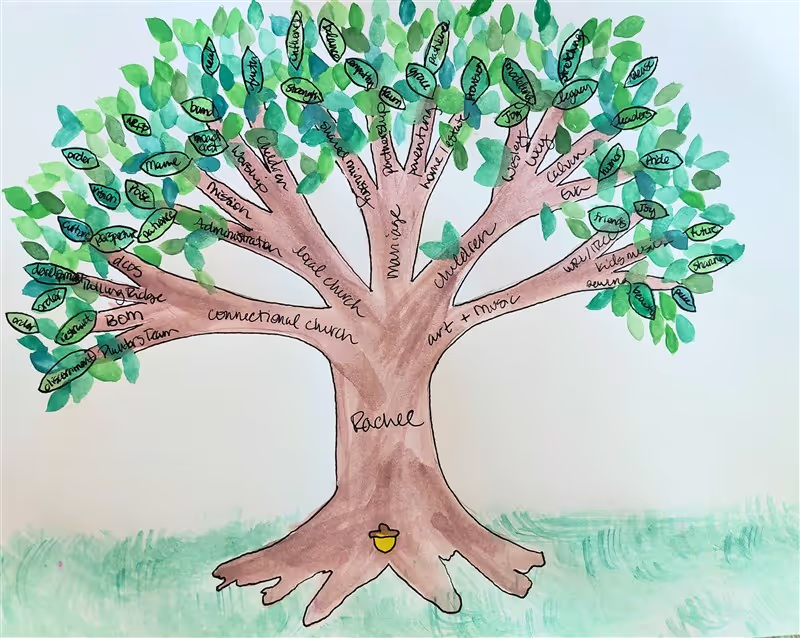
A flourishing tree, painted by Rev. Rachel Fisher, as part of her contemplative meditation on her own pastoral ministry during Manna
“If I could describe Manna retreats as anything,” Geniese tells me, “it’s to be. To be who you are. To be at rest. To be in a way that you can really take a deep look and say, ‘That’s what I’m missing.’” She tells me that one of the things Manna does is give clergy permission to care about their own flourishing. “As a pastor,” Geniese says, “there’s always the tyranny of the urgent. Somebody who needs something right now.” And Manna gives not just permission, but the space, the tools, and the life-giving spiritual relationships to enable long-term growth and vitality.
In a way, Manna is a perfect example of what Rolling Ridge exists to do, and why we believe retreat ministry is so essential—not only for the United Methodist clergy we serve, but for all people. Very often, those who are most in need of rest are the least capable of making space for it. What’s needed is a place apart. A place to remember one’s true calling: to be a human being, not a human doing; to be a beloved child of God; to be a creature at one with all creation—and at home among the trees. As a retreat center rooted in Methodist tradition, we are able to support and enable pastors and congregations to put down their own deep spiritual roots, so that they can weather the storms and droughts of a changing religious landscape and find flourishing in their life and ministry.
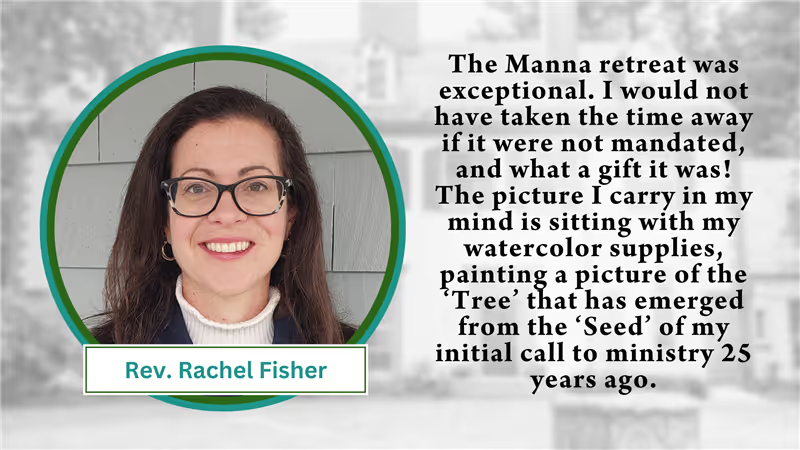
And it seems to be working. I checked in with Rachel about her experience. “The retreat was exceptional,” she told me. “I had never been to the Ridge when I wasn’t working or obligated to someone. To be in that beautiful house, with such nice food, to spend time with others, and with spiritual directors—what a gift it was!” Geniese tells me that Rachel is a prime example of a clergyperson who is incredibly competent because she is able to pay attention to her own flourishing. “If we get people to focus on well-being and flourishing, rather than assessments, the rest of it comes naturally. If a person is flourishing in all areas of their life, you’re going to get competence along the way!”
Flourishing clergy and flourishing congregations—people who are not just eking out a meager existence but thriving. It’s Geniese’s vision for the church she loves, and for the world she lives in. It’s the vision illustrated by the elms and pines and maples that fill the forests of Rolling Ridge. It’s a vision shaped by the Psalmist, written as sacred Scripture in Psalm 1:3, thousands of years ago:
“They are like trees
planted by streams of water,
which yield their fruit in its season,
and their leaves do not wither.
In all that they do, they prosper.”
If you’re a clergyperson interested in joining a Manna cohort, you can learn more (and get in touch with Geniese) on the NEUMC website. Visit https://www.neumc.org/manna.
